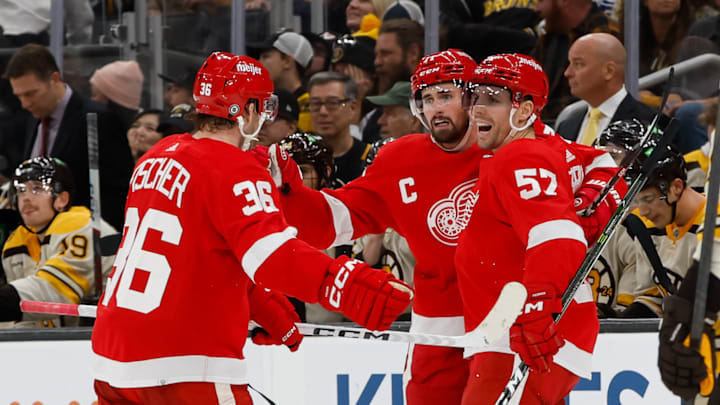4. I can't imagine the Detroit Red Wings without Olli Määttä
This article wouldn’t be complete without my support of Detroit Red Wings defenseman Olli Määttä.
“He’s taking a spot away from Simon Edvinsson!"
If you feel that way, I can see where you are coming from.
My counter to your thought is that if Yzerman thinks Edvinsson is ready, then Yzerman will make room. Yzerman has demonstrated this idea with Lucas Raymond, Moritz Seider, and Joseph Veleno.
At the very least, Yzerman thinks Edvinsson can use seasoning with the Grand Rapids Griffins. Maybe he wants players to have a similar experience to the Syracuse Crunch and the Tampa Bay Lightning, or maybe he wants Edvinsson to work on consistency. Perhaps something entirely different, who knows?
With all that said, both Määttä and Red Wings’ head coach, Derek Lalonde, have shown they have no problem with sitting out for a game or two. Time on ice or role doesn’t seem to impact Määttä’s play, either. Whether he’s playing over 18 minutes or playing less than 15 minutes, we get the same output from Määttä.
It’s a great trait for a veteran to have for numerous reasons. Firstly, it helps the team and coach feel confident with icing Määttä. Secondly, young players can learn from them a guy like Määttä. It may allow them to understand that it’s okay not to play every game or be the star player.
Määttä seems to have a calming, consistent presence that I think every team needs.
Määttä was one of the first, if not the first, veteran to join the Red Wings, willingly, who isn’t just looking for free money. In his introductory media availability after signing with the Red Wings, Määttä expressed his desire to improve his own game. For any player that sets a great example that, no matter where a player is in his career, he can always improve and learn.
Having his name on the Stanley Cup helps Määttä’s case, too. In a league where proven winners are few and far between, this characteristic of Määttä’s shouldn’t be underestimated.
My final reason, at least for the time being, as to why I want to keep Määttä is his possible impact on the young defensemen coming up. He seems like a perfect candidate to pair with a young Edvinsson, Albert Johansson, or William Wallinder.
As a high draft pick himself, Määttä understands the abilities young players have and the pressures they face. On the ice, maybe he can help them find a balance between the risk and reward. We’ve seen flashes of Määttä’s offensive gifts on display, so I know he has those same abilities. He chooses when and how he uses them.
Realistically, with a player like Edvinsson, one might hope to see the skill show up more often than not but this might not be for the best for a low event style team.
He’s the perfect candidate for young defensemen to learn from if that’s something that Määttä is interested in doing.
